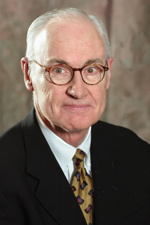
Allyn Mark is recognized internationally for his research in brain control of the cardiovascular system and blood pressure, but his greatest passion is as a mentor to trainees and young faculty.
During a career at the University of Iowa—which has included leadership positions in the Roy J. and Lucille A. Carver College of Medicine as director of the Cardiovascular Division in the Department of Internal Medicine and as the college’s associate dean for research—he has trained 20 physicians and scientists who now have independent research programs and faculty positions, and are leaders and distinguished mentors themselves. Mark is professor and Roy J. Carver Chair in Internal Medicine, as well as founding co-director of the UI Obesity Research and Education Initiative.
Why did you choose a career in medicine?
My dad was a solo family physician in rural Iowa. As a boy, I spent hours with him making house calls and hospital rounds and even observing him delivering babies in a home. He was a spirited and adventurous man with a gift of relating to patients. I realized later that he was my first great teacher of the art and amenities of medicine.
Distinguished Mentor Award ceremony
Allyn Mark will be honored as the 2013 recipient of the UI Carver College of Medicine’s Distinguished Mentor Award in a celebration beginning at 3 p.m. Wednesday, Oct. 16, in Prem Sahai Auditorium, 110 Medical Education and Research Facility, on the UI health sciences campus.
The event also features the Distinguished Mentor Award Lecture by Bruce Spiegelman, the Stanley J. Korsmeyer Professor of Cell Biology and Medicine at the Dana Farber Cancer Institute at Harvard Medical School. His research has elucidated processes that control fat cell differentiation, insulin sensitivity, and pathways of glucose and lipid metabolism. His work has applications to diabetes, obesity, neurodegeneration, and cancer. He will lecture on “Brown and Beige Fat: Basic Biology and Novel Therapeutics.”
The Distinguished Mentor Award and Lecture were established and are supported by a gift to the UI Foundation from UI graduates Nancy Granner and Daryl Granner of North Liberty, Iowa.
As a medical student, two of my UI professors, Ray Sheets and Lewis January, took me aside and encouraged me to pursue an academic career. I decided if the door to academic medicine—with its endless opportunities for interacting with colleagues, students, and trainees, and for renewal—opened to me, I would not let it close. My foot is still in the door.
Who have been your mentors at the University of Iowa?
I sought a research fellowship with Jack Eckstein just before he became dean of the College of Medicine. Jack was the first true physician-basic scientist at Iowa. As dean, he brought Iowa into the modern era of academic medicine and laid the foundation for the physician-scientist at Iowa. He was a superb scientist and an even better mentor. When he became dean (1970-1991), Frank Abboud became my mentor and colleague. Frank introduced me to creativity in science and taught me that it was OK to play with ideas in research the way a child plays with toys. With Eckstein and Abboud, I fell in love with research.
In addition to outstanding mentors, I have been blessed with exceptional faculty colleagues at Iowa and distinguished scientific colleagues at other institutions. These colleagues, including young faculty and trainees, have often been rewarding mentors to me.
What are the characteristics of a good mentor?
As a young faculty, I was struck by the influence that single encounters or single individuals had on my career, and I have tried to honor those who supported me by devoting some of my career to supporting and guiding young physicians and scientists. In today's world, distance is not a barrier to scientific interaction. The key to scientific interaction with former trainees on campus or at a distance is the spirit of “independence with interaction,” of advising and at times collaborating with former trainees while still promoting their independence.
Former trainees and colleagues cite you as a role model because of your commitment to your own personal research renewal. How has your research evolved?
The broad and recurrent theme in my research has been brain control of the cardiovascular system and blood pressure, but within that theme there have been a number of chapters. In the past 20 years, as obesity has become a common cause of high blood pressure, my research has focused increasingly on the causes of obesity-induced hypertension. The causes of obesity itself and its attendant high blood pressure are multiple and complex, but the hope is that an understanding of these may provide insight into new ways of treating obesity-induced hypertension.
I have been privileged to interact closely with nationally prominent scientists, particularly in the past 15 years at Iowa with Curt Sigmund, chair and department executive officer of pharmacology and the Roy J. Carver Chair in Hypertension Research, and Kamal Rahmouni, associate professor of pharmacology and internal medicine. Also enormously rewarding has been my recent research partnership with Robin Davisson, the Andrew Dickson White Professor at Cornell University and professor at Weill Cornell Medical College in New York City, who was formerly at Iowa. For me, these interactions and chapters have provided for career renewal and enlarged my world far beyond my research.